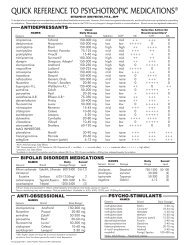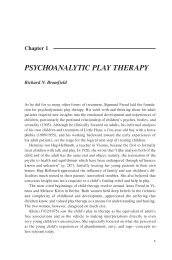IRAQ WAR CLINICIAN GUIDE
Iraq War Clinician's Guide - Network Of Care
Iraq War Clinician's Guide - Network Of Care
You also want an ePaper? Increase the reach of your titles
YUMPU automatically turns print PDFs into web optimized ePapers that Google loves.
Iraq War Clinician Guide 202 Appendix J<br />
<strong>WAR</strong>ZONE-RELATED STRESSREACTIONS:WHATFAMILIESNEED TO KNOW<br />
A National Center for PTSD Fact Sheet<br />
JuliaM. Whealin, Ph.D.<br />
Military personnel in war zones frequently have serious reactions to their traumatic war<br />
experiences. Sometimes the reactions continue after they return home. Ongoing reactions to war<br />
zone fear, horror, or helplessness connected with posttraumatic stress and can include:<br />
Nightmares or difficulty sleeping<br />
Unwanted distressing memories or thoughts<br />
Anxiety and panic<br />
irritability and anger<br />
Emotional numbing or loss of interest in activities or people<br />
Problem alcohol or drug use to cope with stress reactions<br />
How Traumatic Stress Reactions Can Affect Families<br />
Stress reactions in a returning war veteran may interfere with the ability to trust and be emotionally<br />
close to others. As a result, families may feel emotionally cut off from the service member. The<br />
veteran may feel irritable and have difficulty with communication, making himlher hard to get<br />
along with. He or she may experience a loss of interest in family social activities. The veteran may<br />
lose interest in sex and feel distant from his or her spouse. Traumatized war veterans often feel that<br />
something terrible may happen "out of the blue" and can become preoccupied with trying to keep<br />
themselves and family members safe.<br />
Just as war veterans are often afraid to address what happened to them, family members also may<br />
avoid talking about the trauma or related problems. They may avoid talking because they want to<br />
spare the veteran further pain, or because they are afraid of his or her reaction. Family members<br />
may feel hurt, alienated, or discouraged because the veteran has not overcome the effects of the<br />
trauma and may become angry or feel distant from the veteran.<br />
The Important Role of Families in Recovery<br />
The primary source of support for the returning soldier is likely to be his or her family. Families<br />
can help the veteran avoid withdrawal from others. Families can provide companionship and a<br />
sense of belonging, which can help counter feelings of separateness and difference from other<br />
people. They can provide practical and emotional support for coping with life stressors.<br />
If the veteran agrees, it is important for family members to participate in treatment. It is also<br />
important to talk about how the post-trauma stress is affecting the family and what the family can<br />
do about it. Adult family members should also let their loved ones know that they are willing to<br />
listen if the service member would like to talk about war experiences. Family members should talk<br />
with treatment providers about how they can help in the recovery effort.<br />
What Happens in Treatment for PTSD<br />
Treatment for PTSD focuses upon helping the veteran reduce fear and anxiety, gain control over<br />
-.- - - ---.<br />
DEPARTMENT OF VCTERAhS AFFAIRS<br />
NATlOhAL CENTER FOR PTSD




